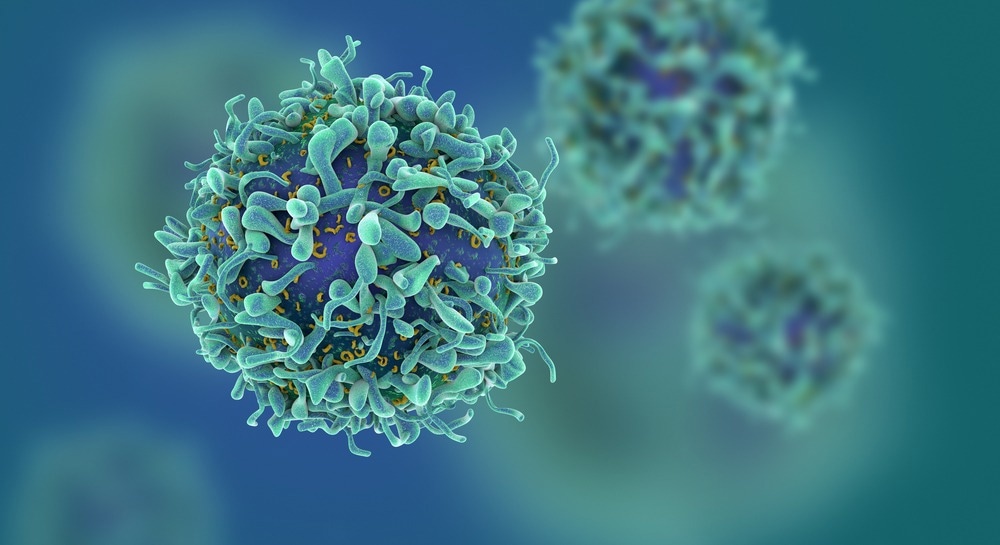Reviewed by Danielle Ellis, B.Sc.Aug 9 2022
An antibody that is successfully used to treat a variety of tumors has been replaced with a tiny molecule that researchers from Tel Aviv University and the University of Lisbon have jointly found and manufactured.
 From left to right: Prof. Helena Florindo, Prof. Ronit Satchi-Fainaro, Dr. Rita Acúrcio, Prof. Rita Guedes. Image Credit: Eric Sultan & University of Lisbon.
From left to right: Prof. Helena Florindo, Prof. Ronit Satchi-Fainaro, Dr. Rita Acúrcio, Prof. Rita Guedes. Image Credit: Eric Sultan & University of Lisbon.
A global team of scientists, led by Prof. Ronit Sachi-Fainaro, Head of the Center for Cancer Biology Research and the Laboratory for Cancer Research and Nanomedicine at the Sackler Faculty of Medicine, Tel Aviv University, as well as Prof. Helena Florindo and Prof. Rita Guedes from the Research Institute for Medicines at the Faculty of Pharmacy, University of Lisbon, is responsible for the ground-breaking discovery.
The study was published in the Journal for ImmunoTherapy of Cancer.
In 2018, the Nobel Prize in Medicine was awarded to James Allison and Tasuku Honjo for their contribution to the study of immunotherapy, the treatment of cancer through activation of the immune system.”
Satchi-Fainaro, Professor, Head, Center for Cancer Biology Research, Tel Aviv University
Prof. Satchi-Fainaro, a 2020 Kadar Family Award recipient, adds, “Honjo discovered that immune cells called T cells express the protein PD-1 that disables the T-cells' own activity when it binds to the protein PD-L1 expressed in cancer cells.”
Prof. Satchi-Fainaro explains, “In fact, the interaction between PD-1 and PD-L1 allows cancer cells to paralyze the T cells, preventing them from attacking the cancer cells. Honjo developed antibodies that neutralize either PD-1 or PD-L1, thereby releasing the T cells to fight cancer effectively.”
The clinical use of antibodies against the PD-1/PD-L1 proteins has already been approved, and they are regarded as holding the greatest promise for the battle against cancer. Without the harsh side effects that occur with medicines like chemotherapy, this immunotherapy can drastically improve patient outcomes.

Image Credit: fusebulb/Shutterstock.com
However, since the antibodies are expensive to make, not all patients can access them. Additionally, because the antibodies are too large to enter and reach less accessible and less exposed portions of the tumor, the treatment does not completely impact the solid tumors. Now, scientists at Tel Aviv University and the University of Lisbon have employed bioinformatic and data analysis methods to discover a more compact and intelligent replacement for these antibodies.
Prof. Satchi-Fainaro says, “Post-doctoral researcher Dr. Rita Acúrcio started with thousands of molecular structures, and by using computer-aided drug design (CADD) models and databases, we narrowed down the list of candidates until we reached the best structure.”
In the second stage, we confirmed that the small molecule controls tumor growth as effectively as the antibodies—it inhibits PD-L1 in animals engineered to have human T cells. In other words, we have developed a molecule that can inhibit PD-1/PD-L1 binding and remind the immune system that it needs to attack the cancer. Moreover, the new molecule has some major advantages over the antibody treatment.”
Satchi-Fainaro, Professor, Head, Center for Cancer Biology Research, Tel Aviv University
Prof. Satchi-Fainaro further states, “First of all, the cost: since the antibody is a biological rather than a synthetic molecule, it requires a complex infrastructure and considerable funds to produce, costing about $200,000 per year per patient.”
“In contrast, we have already synthesized the small molecule with simple equipment, in a short time and at a fraction of the cost. Another advantage of the small molecule is that patients will probably be able to take it at home, orally, without the need for IV administration in the hospital,” elaborates Prof. Satchi-Fainaro.
In addition to accessibility issues, the tests demonstrate that the tiny molecule enhances immune cell activation within the solid tumor mass.
The surface area of a solid tumor is heterogeneous. If there are fewer blood vessels in a particular area of the tumor, the antibody will not be able to get inside. The small molecule, on the other hand, diffuses, and is therefore not entirely dependent on the tumor's blood vessels or on its hyperpermeability. I believe that in the future, the small molecule will be commercially available and will make immunotherapy affordable for cancer patients.”
Satchi-Fainaro, Professor, Head, Center for Cancer Biology Research, Tel Aviv University
Source:
Journal reference:
Acúrcio, R. C., et al. (2022) Therapeutic targeting of PD-1/PD-L1 blockade by novel small-molecule inhibitors recruits cytotoxic T cells into solid tumor microenvironment. Journal for ImmunoTherapy of Cancer. doi.org/10.1136/jitc-2022-004695.